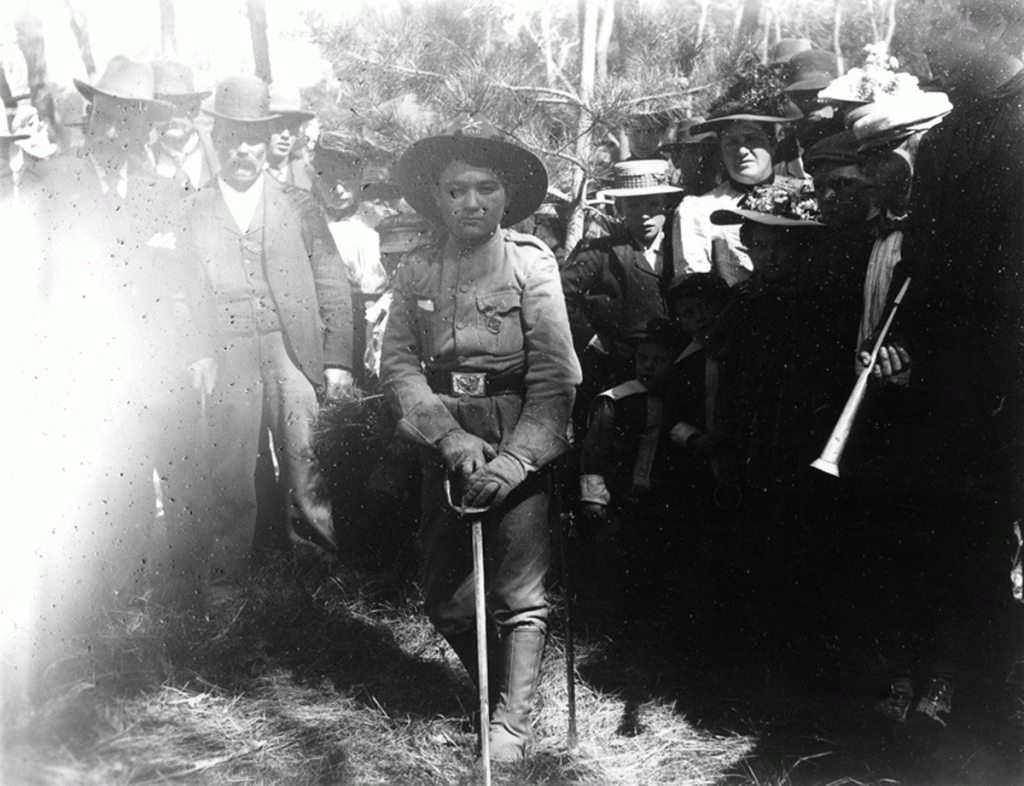In the late 1800s the United States was testing its imperialist might and Spain struggling to hold onto its declining empire. Both had vested interests in the Caribbean islands and as the century came to a close, conflict arose. If you can recall learning the iconic phrase “Remember the Maine!” from your history classes, then you might recall what came to pass when these two world powers came to a head over the fate of Cuba: the Spanish-American War, fought from April to August, 1898.
Despite the exhaustive diplomatic efforts of President McKinley, public support for war with Spain was widespread and extremely vocal. In part stirred to a frenzy by exaggerated reports in newspapers owned and run by William Randolph Hearst (whose father, George Hearst, made his fortune in part from our own Ontario Mine), the American people cried out for justice for the people of Cuba. The sinking of the USS Maine in Havana Harbor in February 1898 was a turning point. By March, nearly all remaining opposition aside from President McKinley himself had been silenced, and by April, war was imminent. The official declaration came on April 25, 1898.
The Spanish-American War was fought in two theaters: the Caribbean and the Pacific. Spain had colonial holdings in the Philippines and other Pacific islands and the United States, under the guise of promised liberation, sent its naval vessels there as well as Cuba. Recruiters from the armed forces were wildly successful in getting volunteers, including many from Utah, to fight in the war.
Thirteen-year-old Bobby Donohue of Park City was swept up by the excitement. Motivated by such local headlines as, “Maine will be avenged and Cuba will be free,” “Johnny get your gun,” “Manila now at mercy of Dewey,” and “Great battle expected tomorrow,” Bobby tried unsuccessfully to enlist. Undaunted by his failure, Bobby ran away from Park City to San Francisco and stowed aboard a ship bound for the Philippines.
Bobby neglected to inform his family of his whereabouts and during the fall of 1898, newspapers throughout Utah published missing notices. Guessing he’d gone to Heber, his mother Bridget made every effort to find him. She “is very anxious to get tidings,” the Park Record reported. To the great surprise of many, when he returned a year later, it was with the Utah battery, soldiers from home with whom he’d connected in Manila. Referred to as the battery’s “mascot,” Donohue went into the record as the youngest veteran of the war.
In 1899, he called upon Governor Wells. Bobby had been denied a medal of honor (reserved for regular volunteers), but upon meeting the boy, Wells was touched. “We’ll see what we can do for you, my boy,” he reportedly said. “I think you are entitled to one.” Donohue “won the hearts of Parkites” and Utahns with his boyish bravery and over the next few years was featured in parades and celebrations lauding the victories of American forces. He did eventually get that medal.

Credit: Park City Historical Society and Museum, Jack Gallivan Digital Collection
Sources:
Emily Beeson, “The Adventure of Bobby Donohue,” for The Beehive Archive a production of the Utah Humanities Council, 2012, http://www.utahhumanities.org/stories/items/show/22
Coalville Times, May 6 and December 9, 1898
Deseret Evening News, April 2, 1898
Ogden Standard, November 14, 1898
Park Record, September 7, 1898; August 26, September 2, 1899; September 18, 1909; November 14, 1924; June 19, 1969
Salt Lake Herald, February 17, May 2, 1898; August 25, 1899
Salt Lake Tribune, December 9, 1898